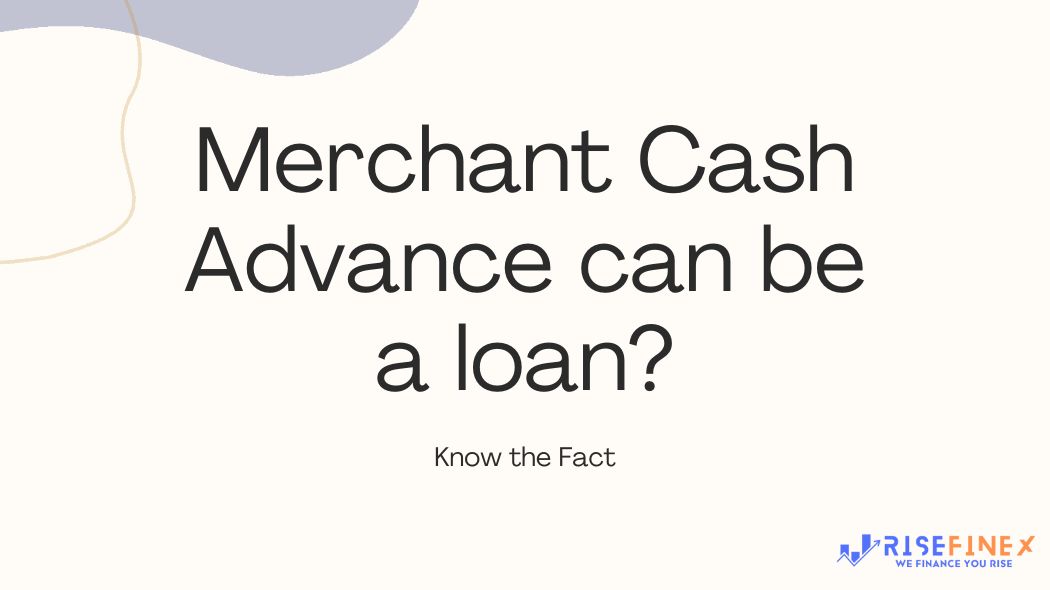All About Merchant Cash Advance Loans
In this article, we will determine whether a Marchant cash advance is a loan or an advance on your sales.
Is MCA a Kind of Loan?
To grow your business, is sometimes required to take funds from others but it is always important to select the right funding option. One common misconception is that a Merchant Cash Advance (MCA) is a type of loan. However, this is not the case. Here’s a closer look at what an MCA is and how it differs from traditional loans.

In this article a detailed breakdown to help you decide which option is better for you.
A Merchant Cash Advance (MCA) is not considered a loan for several key reasons:
Nature of Financing:
An MCA provides a lump sum of cash in exchange for a percentage of future sales, rather than a fixed amount that must be repaid over time like a traditional loan.
Repayment Structure:
Repayment for an MCA is based on daily credit card sales or bank deposits, making it variable and dependent on the business’s revenue. In contrast, loans typically have fixed monthly payments.
Approval Process:
MCAs often have a simpler approval process that focuses on sales volume rather than credit history, which is a primary factor for traditional loans.
Cost of Capital:
The cost associated with an MCA can be higher than that of a traditional loan, as it is often calculated as a factor rate rather than an interest rate, leading to potentially higher overall costs.
Lack of Regulatory Classification:
MCAs do not fall under the same regulatory framework as loans, which can affect how they are treated legally and financially. These distinctions highlight why MCAs are considered a unique form of financing rather than a traditional loan. The repayment process for a Merchant Cash Advance (MCA) differs significantly from that of a traditional loan.
MCA Repayment Process
The MCA (Merchant Cash Advance) Repayment Process is typically structured as a percentage of daily or weekly sales rather than fixed monthly payments. There are two common repayment methods
Percentage of Sales
Repayment is based on a fixed percentage of the business’s daily credit card sales or bank deposits. This means that when sales are high, the repayment amount is larger; when sales are low, the repayment is smaller.
Daily / Weekly Deduction
Payments are deducted daily, which can help businesses manage their cash flow more effectively during fluctuating sales periods.
No Fixed Schedule
There is no fixed repayment schedule like monthly payments; instead, the total amount repaid varies based on sales performance.
Since MCA repayments are tied to revenue, payments fluctuate with business performance, making them flexible but often expensive due to high factor rates.
Traditional Loan Repayment Process
Fixed Monthly Payments
Traditional loans require fixed monthly payments over a specified term. This means businesses must budget for the same payment amount each month, regardless of sales performance.
Interest Rates
Payments consist of both principal and interest, and the interest rate is typically fixed or variable, impacting the total amount paid over the loan’s duration.
Longer Terms
Loans often have longer repayment terms, ranging from a few months to several years, which can lead to a more predictable repayment structure.
Summary
In summary, MCAs offer a flexible repayment option tied to sales performance, while traditional loans require fixed payments that can strain cash flow during slower sales periods. This flexibility makes MCAs appealing to businesses with variable income, though they often come with higher costs compared to traditional loans. If you don’t know the basics of a merchant cash advance you can read the article
Want to Know about MCA Rate, Term and options?
If you’re considering MCA may not suite for your you can get our other funding solutions like, small business loan, line of credit, startup funding and many more. To know more about instant MCA Fund YOU Can see here detail term rate follow link below:
Explore Merchant Cash Advance As your Financing Option
Keep growing your business with confidence, and remember: the right financing partner can make all the difference.


